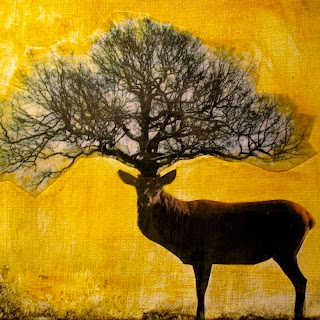
Artist:
Deertree
Release Date: April 1, 2013
Label: Independent
Deertree is the folk solo project of Thom Koehly, and his eponymous debut is charming; a quaint folk album that doesn't push too hard in any one direction, but rather sets a gentle and nurturing mood.
Deertree tells a bleak but beautiful tale of a lost traveler and ensuing loneliness conveyed through a variety of colorful vocal harmonies and warm guitar tones. With tracks flowing from one to the next perfectly, this album feels less like a collection of individual works but rather chapters of the same novel. Along with similar lyricism, most of these songs share very similar chord progressions. Not to call the songs uninspired, but they all sound quite similar to one another (especially “Walkin I,” “Everything or Nothing,” “Jeneher: Trying to Reach the Sea,” “Barefoot Pilgrim,” and “Walkin II.”) It unifies the songs in a way that can get tiresome with repeated listens, but keeps the album feeling like one larger story..
Droning guitar playing is another factor in the similarity of these songs. Often times progressions move slow and timidly, but nonetheless precisely move from chord to chord. There a good few songs that break the mold; tracks like "The Little Boy Lost" or "Jeneher: Trying To Reach The Sea" have much more interesting features. "The Little Boy Lost," the opener, sounds straight off of
Bon Iver’s
For Emma, Forever Ago. This isn't to say that it’s not interesting or creative, just that it sounds extremely similar on account of the guitar playing and strong falsetto vocals. Koehly uses a large range of vocal styles on
Deertree, ranging from low raspy tones on "The Morning Lights" to the enchanting harmonies in falsetto on "The Little Boy Lost” which, unfortunately, is the only track where Koehly shows off his impressively tender upper range.
Koehly's elusive lyricism brings forward themes of loneliness, loss of purpose, and hopelessness. Fantastic moments appear abruptly throughout this album. For instance, as "Everything or Nothing" bursts into a 3/4 explosion at 4:09, Koehly sings "everything was still nothing." Coming from the previous sections of the song, this is quite impactful. Another example is "The Morning Lights" where 3 or 4 part harmonies come in belting "I'm not dying! I'm not dying! The lazy day is over. I can." For all the moments where there are meaningful lyrics, there are many moments where his singing can't be understood or is just inaudible. It's either his singing or the mixing that gets in the way of hearing his lyrics, which are vital for this album's enjoyment.
The instrumentation and aesthetic, unfortunately, don't hold up amazingly after repeated listens. Koehly depends too much on mood and feeling at times, causing some tracks to get rather bland after a few listens. Instead of finding new things interesting, it becomes easier to find mistakes or unfavorable moments. The chord progression used on many tracks can become tired and the toy piano (which, granted, is used infrequently) loses it's charm after a few listens. That being said, the album is still a good listen but it doesn't hold up well under a magnifying glass.
Deertree is the story of a lost traveler unsure of where he's going or what he's doing. Everybody questions themselves during their life as to what they're doing or where they want to be. At some point in their lives, everybody misses their family, can get homesick, or gets lost altogether.
Deertree relates to the scary pictures of uncertainty drawn on life's canvas. This album is going to go over well with a lot of people, I'm sure; Koehly's voice is beautiful, and his guitar playing is moody as anything. If you've ever liked anything in the new era folk-pop genre (
Arcade Fire,
Bon Iver,
Sufjan Stevens) I recommend this album. If you don't, I wouldn't stay away but don't expect anything that'll crack your top 10 for the year.




